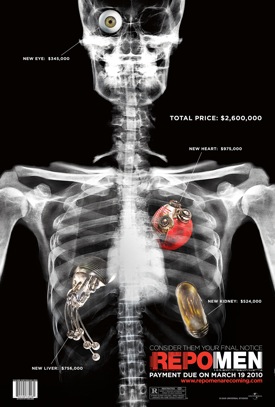Bounty hunters and viral bar codes aren’t exactly Hollywood’s usual way of marketing a movie. But Universal is banking on some extreme measures to promote this weekend’s "Repo Men."
Jude Law and Forest Whitaker star in the film as two gun-packing heavies who repossess the artificial organs, or artiforgs, of defaulting customers by any means necessary. With "wild postering" campaigns and a $30,000 contest turning fans into real hunters and runners, the studio is taking the same anything-goes approach.
Working with an estimated $30 million promotional budget, the approach is all about full immersion in the dsytopic world of “Repo Men,” which ironically comes out the same day as Jennifer Aniston and Gerald Butler’s “The Bounty Hunter.”
“This was a perfect scenario to try an unconventional marketing tactic with a unique mobile extension that tied directly to the theme of the film,” Universal’s digital marketing manager Ben Blatt told TheWrap. “We decided to go after the tech-savvy young male that is a major part of the demo for this film.”
To start with, the studio set up a website featuring eerie authentic-seeming ads for the Union — the company that sells the organs in the movie. That done, the studio took the movie to the streets.
“This was a perfect scenario to try an unconventional marketing tactic with a unique mobile extension that tied directly to the theme of the film,” Blatt said.
The first attack was a poster campaign.
In the movie, the artiforgs are all bar-coded; Repo Men hunt down delinquent customers and scan their bodies to see if their payment has been made. If not, they throw the customer to the floor, take out the organ and return it to the company.